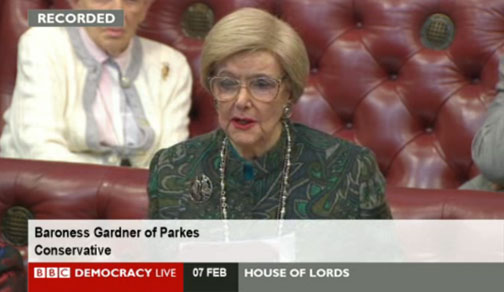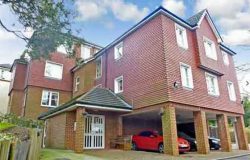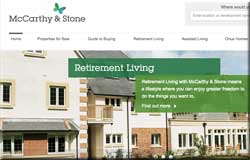The House of Lords had another short debate on leasehold reform last Thursday and urged the case for revisit the sector.
The debate was initiated by by LibDem peer Baroness Maddock, who said “further reform is still needed and is very much a live concern for the millions of people living in leasehold properties”.
“The majority of new homes being built are flats, bringing the whole matter of leasehold further to the fore. The current system vests too much power in the hands of freeholders.
“As a Liberal, I always want to devolve power to as many people as possible, so I want to see leaseholders having a proper say in the management of their homes.”
Baroness Maddock said that right to manage was a “a little known provision, and backed the think-tank CentreForum’s leasehold report which urged that information about right to manage be included in service charge demands”.
There was also backing for a renewed look at commonhold tenure, and the Leasehold Knowledge Partnership, with Sir Peter Bottomley, is hosting a Westminster round-table on the subject on June 26.
“CentreForum has proposed that in order to build a critical mass of commonhold properties, and to establish the system as part of the norm, all new blocks of flats built after 2020 should be sold as commonhold,” said Baroness Maddock.
Baroness Maddock was concerned about leaseholders being charged for improvements to their properties, which benefit freeholders twice. Once when they demand an initial charge, and again “because, invariably, the improvements increase the value of the property”.
“When the lease is then renegotiated or sold at a higher value, the freeholder benefits. CentreForum has proposed that the right to charge for permission to make improvements should only be available when the freeholder can prove that the charge requested would reduce the value of the property.”
Baroness Gardner of Parkes chose to refer to the LKP figures on leaseholders, referring to five million leaseholders, not the three million leasehold properties the government adopts.
“Even in political terms, people should be aware that 5 million votes are worth having. It is important.
She added that the “problem with leasehold [is that] people really do not understand it until they are already caught up in it, particularly if they are caught up in it in the wrong way, because they did not look at the lease before signing it or they were so thrilled with what they found that they put aside any worries about the future.”
Baroness Gardner described her own frustrations with a leasehold flat, which she bought for “the day when I could not manage stairs”.
“At the time, all those years ago, we had a residential porter who took any parcels, let people in and did all sorts of useful things.
“What happened? The head lessee became a person who was interested only in making a profit out of it.
“They decided that the flat which the caretaker was living in was too expensive for that money to be wasted like that, so they fired the caretaker and now have someone who comes in for two or three hours a day and the money from that is now in the head lessee’s pocket.
“There has been too much of this profiteering at the expense of residents in these blocks.”
“Transparency is perhaps the biggest problem for everyone. People do not know what they are being charged for and whether or not it is legitimately required.”
She paid tribute to the work of Sir Peter Bottomley in the sector.
“There have been too many occasions—cases on the record—where people have found that they are making payments for things such as service charges but half of that money goes into the pocket of the head lessee or freeholder, who has made a deal with or even owned the builders or insurance company used.
“It is all quite wrong that that sort of thing should be happening and that leaseholders do not get honest answers when they ask about it.”
Baroness Gardner expressed her enthusiasm for commonhold as an alternative form of tenure, and lamented the state of the property tribunals.
“Something has gone very wrong with leasehold valuation tribunals since the basic £500 maximum that you were asked to pay has been changed to a £500 minimum to bring your case at all, and with possibly very heavy costs after that.
“We also have the practice, which I have mentioned in the House before, whereby, win or lose, the head lessee or freeholder charges his costs in the tribunal back to the leaseholders. That was never the intention.
“The intention was that a leaseholder would not normally have to meet any costs and this would be a basis on which everyone could present their own cases. There is now a new tribunal system, as from last October, and I think we will be hearing a lot of dissatisfaction about this very shortly.”
 Responding for the government, Baroness Stowell of Beeston (right) made an issue of the amount of leasehold properties in England and Wales.
Responding for the government, Baroness Stowell of Beeston (right) made an issue of the amount of leasehold properties in England and Wales.
“… Lady Gardner estimated that there were about 5 million leasehold properties in England. The Government estimate 3 million, but that certainly makes up a significant proportion of the housing market.”
She added that she was an owner-occupier of a leasehold flat and understood “that it can be a complex and technical legal system”.
“But not everyone who owns a leasehold property experiences a lot of problems. What is important is that we strike the right balance in a way that recognises and protects the rights and interests of both leaseholders and freeholders and that we make sure that these rights are kept up to date with changing realities without making things more complicated, burdensome or expensive.”
Baroness Stowell said that she would be asking developers why commonhold is not pursuing commonhold as an option.
“The key point that I want to make in conclusion is that, while we do not have plans to reform the legislation in this area, my honourable friend the Housing Minister is very interested in the concerns that are being raised.”
Lord Best, the former chairman of the Hanover housing association, will be chairing an all-party meeting on leasehold issues.
Full debate can be read here

























The Housing Minister, the previous one,and the one before that said they were very interested in Exit Fees following the OFT Inquiry which declared they were unfair and should be scrapped.
That’s as far as it ever went and no doubt Baroness Gardners concerns will receive the same treatment.
I have corresponded with the latest Housing Minister five times asking what the latest news is on a Exit Fees but I have been completely ignored.
Michael Hollands,
You can be sure the first time a cabinet minister claims a retirement apartment as their second home, exit fees will stop!
Mark Prisk seemed to be the only one that had an understanding of Leasehold issues/abuses and was doing a good job at starting to unravel the web of deceit.
Unfortunatley he must have ruffled a few feathers within Government circles and was moved rather Grant Sharpish…
Baroness Stowell said that she would be asking developers why commonhold is not pursuing commonhold as an option.- The answer is quite SIMPLE .
Its Government Policy to let the Developer decide what property title to offer for selling a new property . Obviously the developer will offer whatever gives the highest profit and both his solicitor and his accountant will advise the highest return comes from selling leases. The Government and successive Housing Ministers do not care or think about about the longterm economic consequences from following such policy.
Freehold title and commonhold title means the property can only be sold ONCE and ownership is transferred to the property buyer. Using leasehold title, the Developer sells a longterm rental agreement which expires at the end of the lease term and the property reverts to the “freehold reversioner”.
The tax rules make it easy for the developer to offer leasehold title and any lease over 21 years term is considered a long lease and covered by the Landlord & Tenant Acts 1985 etc. Mortgage lenders have their own rules and decline to offer loans on leases under 70 years unexpired. So we used to see 99 year leases with annual ground rent doubling every 33 years but these had to be extended before the lease fell below 80 years as the cost of extension is increased by marriage value factor. Nowadays its more common to see new flats offered with 125 years leases with ground rent doubling every 25 years But some greedy .developers have sold leases with annual ground rent doubling every 10 years which can be very costly in later years.
The Council of Mortgage Lenders( CML) is the trade association for which most mortgage lenders in UK.are members. The CML decided long ago that its member should only make loans to property in blocks of flats having a maintenance contract which is satisfied by a lease of atleast 70 years unexpired term. This is the reason why very few flats in UK are sold under freehold title which means the property cannot be mortgaged by a buyer . This is my understanding .
Getting a mortgage means getting the property valued at market price for establishing the value of the lease as security for the loan. I think there may be some difficulty for RICS surveyors valuing Comonhold Property as security for loans if the Council of Mortgage Lenders are not willing to change from their current policy stance biased in favour of Leasehold title.
Walk into any retail mortgage shop and ask if they offer mortgages on property under Commonhold title and you probably find the shop staff know nothing about Commonhold . The Developers will continue to offer new property in blocks of flats under leasehold title to ensure compliance to Mortgage Lenders loan requirements.
In any block of new flats, the developer typically gains 98%-99% of its sales revenue from premiums paid for sale of 125 years leases for leasehold flats to flat buyers and a further 1%-2% for sale of freehold title to an investor company which seeks income from the annual ground rent payable by leaseholders. Many private investors have given up on this kind of investment in ground rent due to 40% inheritance tax and today most freehold ground rent investors are companies taking full advantage of the taxation system.
Some 15 years ago, an estate in North london comprising of new 54 flats sold for approx GBP 140K per unit on average, giving the Developer around GBP 7 Mil total and later sold the freehold title to the Management Company for about GBP 112K ( financed probably by 70% bank loan). So for an outlay of only GBP 35K , the Management Company gained ownership of the freehold estate including 54 leasehold flats for which the leaseholders had paid GBP 2 Mil -2.5 Mil deposit and mortgage debt of about GBP 5Mil to be paid off over 25 years. Even after 25 years paying off the mortgages by the leaseholders, the property still belongs to the freeholder which could still be holding a 70% bank loan but the value of lease premiums will start to fall at roughly 1% annuallly after the unexpired term falls below 80 years. At the end of the lease term, the GBP 7 Million ( In todays value) paid by the public buyers will be wiped out by a GBP 35 K investment made by the Management Company .
So the residential lease is never a good investment for the leaseholder and the leasehold system really benefits the freeholder. Since the loss in value of the lease premium has to be bourne by successive generations of leaseholders, it really damages the family savings efforts of many families buying and owning leasehold property over the long term and this result collectively damages the UK economy.
We live in an economy operating under a capitalist system and our Government should be focussed to protect the family savings of the 5 million leaseholders ( or 3 million claimed by Government according to Baroness Stowell of Beeston ). There must be a good reason why almost all other countries have moved to Commonhold title and leaving England & Wales still continue using the leasehold system. Even our neighbours in Scotland and Ireland don’t use leasehold system anymore..